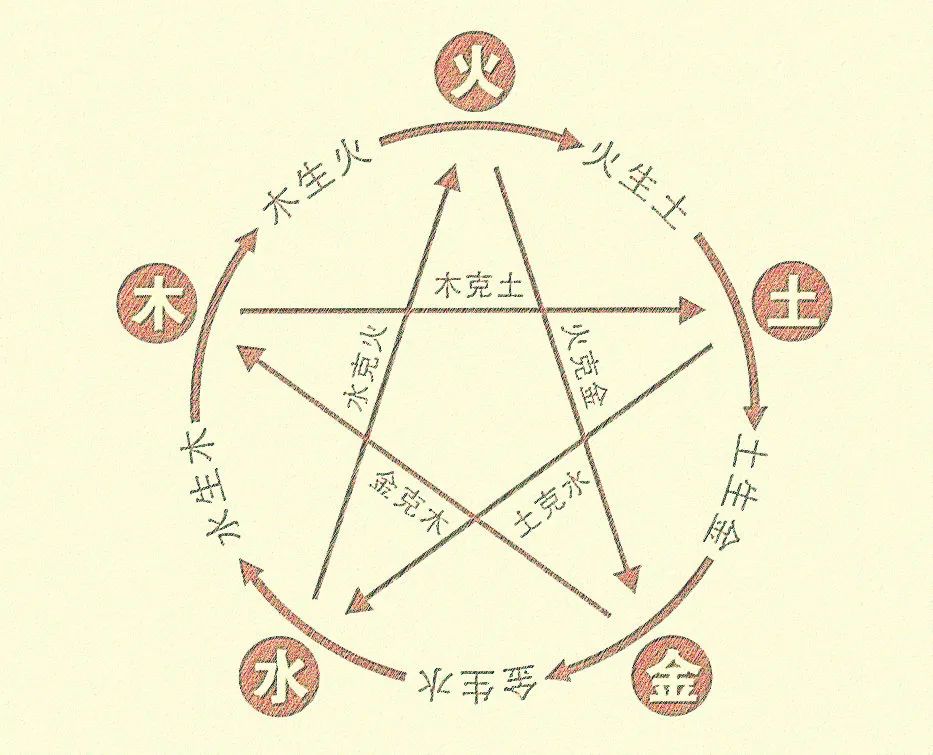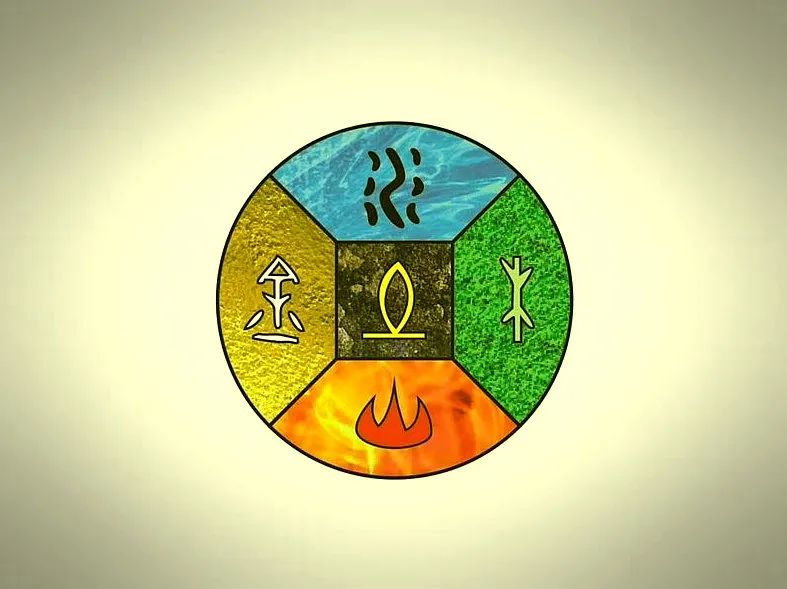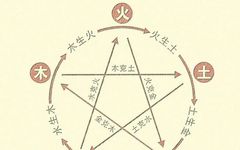The Interactions of the Five Elements
The theory of the Five Elements (Wu Xing) is not a static or isolated classification of phenomena into five categories, but rather an exploration of the interrelationships and balance among these elements through their generating (sheng) and overcoming (ke) interactions. Additionally, it examines the effects of excessive dominance (cheng) and insult (wu) among the elements, which disrupts their harmonious balance. This is the primary function of the interactions of the Five Elements.
1. Generating (Sheng)
Generating refers to the nurturing and supportive relationships among the Five Elements. The generating cycle indicates that there is an orderly sequence of mutual support and promotion among Wood, Fire, Earth, Metal, and Water. Therefore, the generating relationships should not be misunderstood as chaotic, bidirectional support. The order of generating is: Wood generates Fire, Fire generates Earth, Earth generates Metal, Metal generates Water, and Water generates Wood; thus, the cycle continues endlessly, i.e., Wood, Fire, Earth, Metal, Water, generating in sequence.
In the generating relationships, each element has both a “generating” (sheng wo) and a “generated” (wo sheng) aspect. The generating element is considered the mother, while the generated element is the child. In the Nan Jing, this relationship is metaphorically described as a mother-child relationship. For example, with Fire, since Wood generates Fire, Wood is the “mother”; since Fire generates Earth, Earth is the “child”. Thus, Wood is the mother of Fire, and Earth is the child of Fire, establishing a mother-child relationship between Wood and Fire, as well as between Fire and Earth.
2. Overcoming (Ke)
Overcoming, also known as “victory” (xiang sheng), refers to the restraining and controlling relationships among the Five Elements. The overcoming cycle indicates that there is an orderly sequence of mutual restraint among Wood, Fire, Earth, Metal, and Water. Therefore, the overcoming relationships should not be misunderstood as chaotic, bidirectional restraint. The order of overcoming is: Wood overcomes Earth, Earth overcomes Water, Water overcomes Fire, Fire overcomes Metal, and Metal overcomes Wood; thus, the cycle continues endlessly. The order of overcoming is Wood, Earth, Water, Fire, Metal.
In the overcoming relationships, each element has both a “overcoming” (ke wo) and a “overcome” (wo ke) aspect. The overcoming element is the “victor” (suo sheng), while the overcome element is the “defeated” (suo bu sheng). For example, with Wood, since Wood overcomes Earth, Wood is the “overcoming” element; since Metal overcomes Wood, Metal is the “defeated” element.

The theory of the Five Elements posits that generating and overcoming are two indispensable aspects of the normal relationships among phenomena. Without generating, there would be no source for transformation; without overcoming, there would be excess leading to harm. The unity of generating and overcoming maintains the balance and coordination among phenomena.
Furthermore, within the relationships of generating and overcoming, there exists a duality: generating contains overcoming, and overcoming contains generating. For example:
Wood generates Fire, Fire generates Earth, Earth generates Metal, while Wood can also overcome Earth, and Metal can overcome Wood.
Wood overcomes Earth, Earth overcomes Water, while Water can generate Wood, and Fire can generate Earth.
Thus, following the sequence of Wood, Fire, Earth, Metal, Water, generating occurs in sequence, with generating containing overcoming, and overcoming containing generating, leading to endless transformations. Therefore, the Classics of Changes states: “The mechanisms of transformation cannot exist without generating, nor without restraint; without generating, there is no growth, and without restraint, there is excess leading to harm.”
3. Multiplying (Cheng)
Multiplying refers to the dominance of one element over another. The multiplication of the Five Elements indicates excessive restraint of one element over another that it overcomes. The order of multiplication is the same as that of overcoming: Wood multiplies over Earth, Earth multiplies over Water, Water multiplies over Fire, Fire multiplies over Metal, and Metal multiplies over Wood.
The causes of multiplication among the Five Elements can be attributed to two aspects: “excess” (tai guo) and “deficiency” (bu ji).
Multiplication due to excess refers to a situation where one element is overly dominant, excessively restraining the element it overcomes, leading to the weakness of the latter and resulting in abnormal interactions among the Five Elements.
For example, if Wood is overly dominant, it may excessively restrain Earth, which, although not inherently weak, cannot withstand the excessive restraint from Wood, leading to a deficiency in Earth. This phenomenon of “multiplication” is termed “Wood multiplies over Earth”.
Multiplication due to deficiency refers to a situation where one element is overly weak, unable to withstand the normal restraint from the element it is overcome by, thus becoming even weaker.
For instance, if Wood is not overly strong, its ability to restrain Earth remains within normal limits. However, if Earth is deficient, Wood’s ability to restrain Earth may appear relatively stronger, leading to a further deficiency in Earth. This phenomenon of “multiplication” is termed “Earth deficiency leads to Wood multiplying”.
Although “multiplication” and “overcoming” share the same order, they are distinct phenomena. Overcoming represents the normal restraining relationships among the Five Elements, while multiplication represents an abnormal restraining phenomenon, hence it is also referred to as “overcoming” and termed “multiplying”.
4. Insulting (Wu)
Insulting, also known as counter-insult (fan wu), refers to the reverse overcoming of one element over another that it does not normally overcome. The order of insulting is: Wood insults Metal, Metal insults Fire, Fire insults Water, Water insults Earth, and Earth insults Wood.
The causes of insulting among the Five Elements, similar to multiplication, can also be attributed to two aspects: “excess” and “deficiency”.
Insulting due to excess refers to a situation where one element is overly dominant, causing the element that normally restrains it to not only fail to restrain it but also to be insulted by it.
For example, if Wood is overly dominant, the element Metal, which normally overcomes Wood, cannot restrain it and is instead insulted by Wood, resulting in the phenomenon of “Wood insulting Metal”.
Insulting due to deficiency refers to a situation where one element is overly weak, unable to restrain the element it is overcome by, and thus becomes subject to counter-overcoming.
For instance, under normal circumstances, Metal overcomes Wood, and Wood overcomes Earth. However, if Wood is excessively weak, not only can Metal overcome Wood, but Earth may also counter-overcome Wood due to its weakness, resulting in the phenomenon termed “Earth insults Wood”.
The phenomena of multiplication and insulting among the Five Elements arise when the normal generating and overcoming relationships are disrupted, leading to abnormal overcoming phenomena. Both can be caused by either “excess” or “deficiency” of any element, and while they are distinct, they are also interconnected.
The primary distinction is that multiplication occurs according to the order of overcoming, while insulting occurs in the reverse order of overcoming. The connection between the two is that when multiplication occurs, insulting may also occur simultaneously; conversely, when insulting occurs, multiplication may also occur. In reality, multiplication and insulting are closely related, representing two aspects of the same issue.

The Relationships of Generating, Overcoming, Multiplying, and Insulting among the Five Elements
The relationships and laws of generating and overcoming among the Five Elements indicate that without generating, there can be no occurrence or growth of phenomena; without overcoming, there can be no maintenance of balance and coordination in the development and transformation of phenomena. Every relationship, both within and between phenomena, contains the inseparable aspects of generating and overcoming, and within generating, there is overcoming, and within overcoming, there is generating, mutually causal, opposing yet complementary, and supporting the normal occurrence, development, and transformation of phenomena.
The law of generating among the Five Elements is: Wood generates Fire, Fire generates Earth, Earth generates Metal, Metal generates Water, Water generates Wood. (Wood, Fire, Earth, Metal, Water)
The law of overcoming among the Five Elements is: Wood overcomes Earth, Earth overcomes Water, Water overcomes Fire, Fire overcomes Metal, Metal overcomes Wood. (Wood, Earth, Water, Fire, Metal)
1. Generating and Overcoming
Generating refers to the promoting, supporting, and nurturing role of one phenomenon over another; overcoming refers to the restraining and controlling role of one phenomenon over another’s growth and function.
Generating and overcoming are considered normal phenomena in the natural world; they also represent normal physiological phenomena in the human body. It is precisely because of the relationships of generating and overcoming that the natural world maintains ecological balance, and the human body maintains physiological balance, hence the saying “restraint leads to transformation”.
The order of generating among the Five Elements is: Wood generates Fire, Fire generates Earth, Earth generates Metal, Metal generates Water, Water generates Wood. (Wood, Fire, Earth, Metal, Water)
The order of overcoming among the Five Elements is: Wood overcomes Earth, Earth overcomes Water, Water overcomes Fire, Fire overcomes Metal, Metal overcomes Wood. (Wood, Earth, Water, Fire, Metal)
Due to the relationships of generating and overcoming among the Five Elements, from any single “element”, there exist four aspects of relationships: “generating me” (sheng wo), “I generate” (wo sheng), “overcoming me” (ke wo), and “I overcome” (wo ke).
“Generating me” and “I generate” are metaphorically described as the relationship between “mother” and “child” in the Nan Jing. The generating element is the “mother”, while the generated element is the “child”. For example, with Fire, since Wood generates Fire, Wood is the “mother”; since Fire generates Earth, Earth is the “child”. Thus, Wood is the mother of Fire, and Earth is the child of Fire; in this way, Wood and Fire are “mother and child”, and Fire and Earth are also “mother and child”.
“Overcoming me” and “I overcome” are referred to as “not victorious” (suo bu sheng) and “victorious” (suo sheng) in the Nei Jing. The overcoming element is the “not victorious” (suo bu sheng), while the overcome element is the “victorious” (suo sheng). For example, with Fire, since Fire overcomes Metal, Metal is the “overcome” element; since Water overcomes Fire, Water is the “overcoming” element.
Generating and overcoming are inseparable aspects. Without generating, there can be no occurrence or growth of phenomena; without overcoming, there can be no maintenance of normal relationships under coordination and change. Only through sequential generating and sequential overcoming, like an endless loop, can transformation continue without end, maintaining the dynamic balance among phenomena.
2. Multiplying and Insulting
The phenomena of multiplying and insulting among the Five Elements refer to abnormal overcoming phenomena that arise when the normal generating and overcoming relationships are disrupted.
Multiplying: Multiplying refers to the dominance of one element over another. The multiplication among the Five Elements indicates that one element excessively restrains another element that it overcomes, leading to a series of excessive restraint reactions.
When one element is overly dominant, it can cause the element it overcomes to be excessively restrained, resulting in weakness in the latter, leading to abnormal interactions among the Five Elements. For example, if Wood is overly dominant, it may excessively restrain Earth, leading to a deficiency in Earth, termed “Wood multiplies over Earth”.
On the other hand, if one element is weak, its ability to restrain the element it overcomes may appear relatively stronger, leading to further weakness in itself. For example, if Wood is not overly strong, its ability to restrain Earth remains within normal limits. However, if Earth is deficient, Wood’s ability to restrain Earth may appear relatively stronger, leading to a further deficiency in Earth, termed “Earth deficiency leads to Wood multiplying”.
Insulting: Insulting refers to the reverse overcoming phenomenon. In the context of the Five Elements, insulting occurs when one element is overly dominant, leading to the original overcoming element being insulted instead. For example, if Wood is overly dominant, the element Metal, which normally overcomes Wood, cannot restrain it and is instead insulted by Wood, resulting in the phenomenon termed “Wood insults Metal”.
On the other hand, if Metal is weak, it cannot restrain Wood and may instead be insulted by Wood, termed “Metal deficiency leads to Wood insulting”.
Multiplying and insulting are both abnormal overcoming phenomena, and while they are distinct, they are also interconnected.
The primary distinction between multiplying and insulting is that the former occurs due to excessive restraint according to the order of overcoming, while the latter occurs in the opposite direction of the overcoming order, resulting in abnormal overcoming relationships among the Five Elements.
The connection between the two is that when multiplication occurs, insulting may also occur simultaneously; conversely, when insulting occurs, multiplication may also occur. For example, when Wood is overly strong, it can both multiply over Earth and insult Metal; when Metal is weak, it can be insulted by Wood and also be multiplied over by Fire.
 The above content is for public sharing, discussion, and reference only, and does not reflect or represent the opinions or views of the Life Physics Society operators. Please think objectively and do not follow blindly or reject. Please verify or choose when forwarding and quoting. If there are copyright issues, please contact us via email: [email protected], and we will correct it promptly.
The above content is for public sharing, discussion, and reference only, and does not reflect or represent the opinions or views of the Life Physics Society operators. Please think objectively and do not follow blindly or reject. Please verify or choose when forwarding and quoting. If there are copyright issues, please contact us via email: [email protected], and we will correct it promptly.

